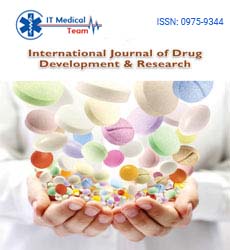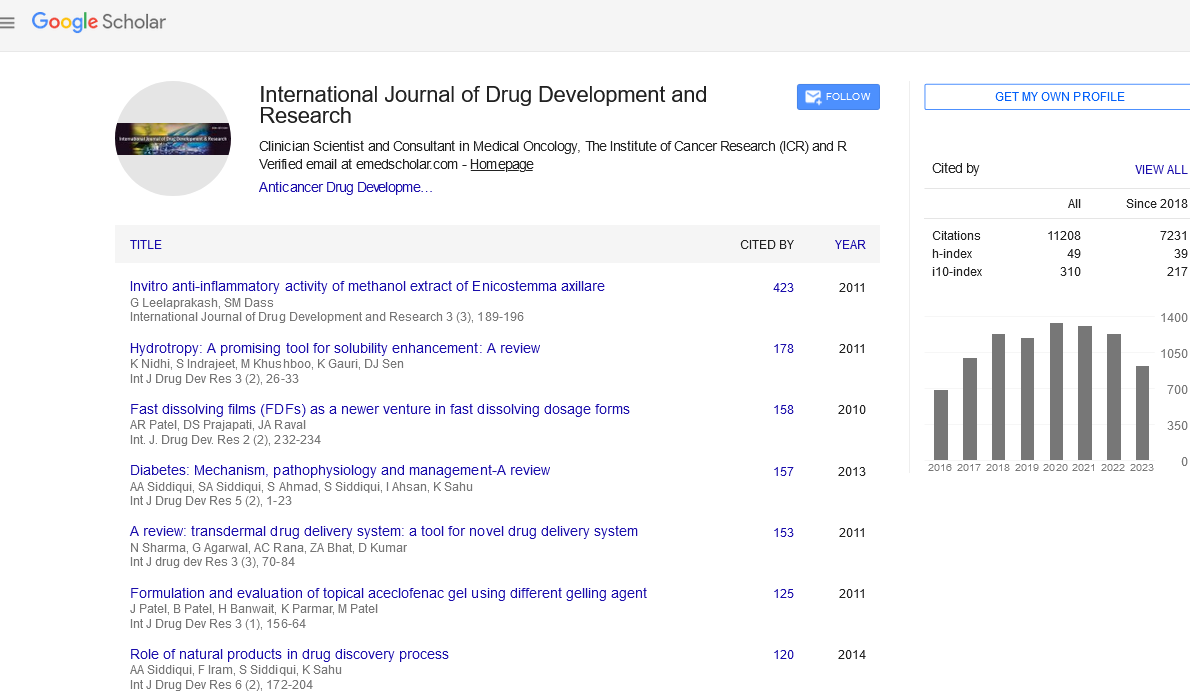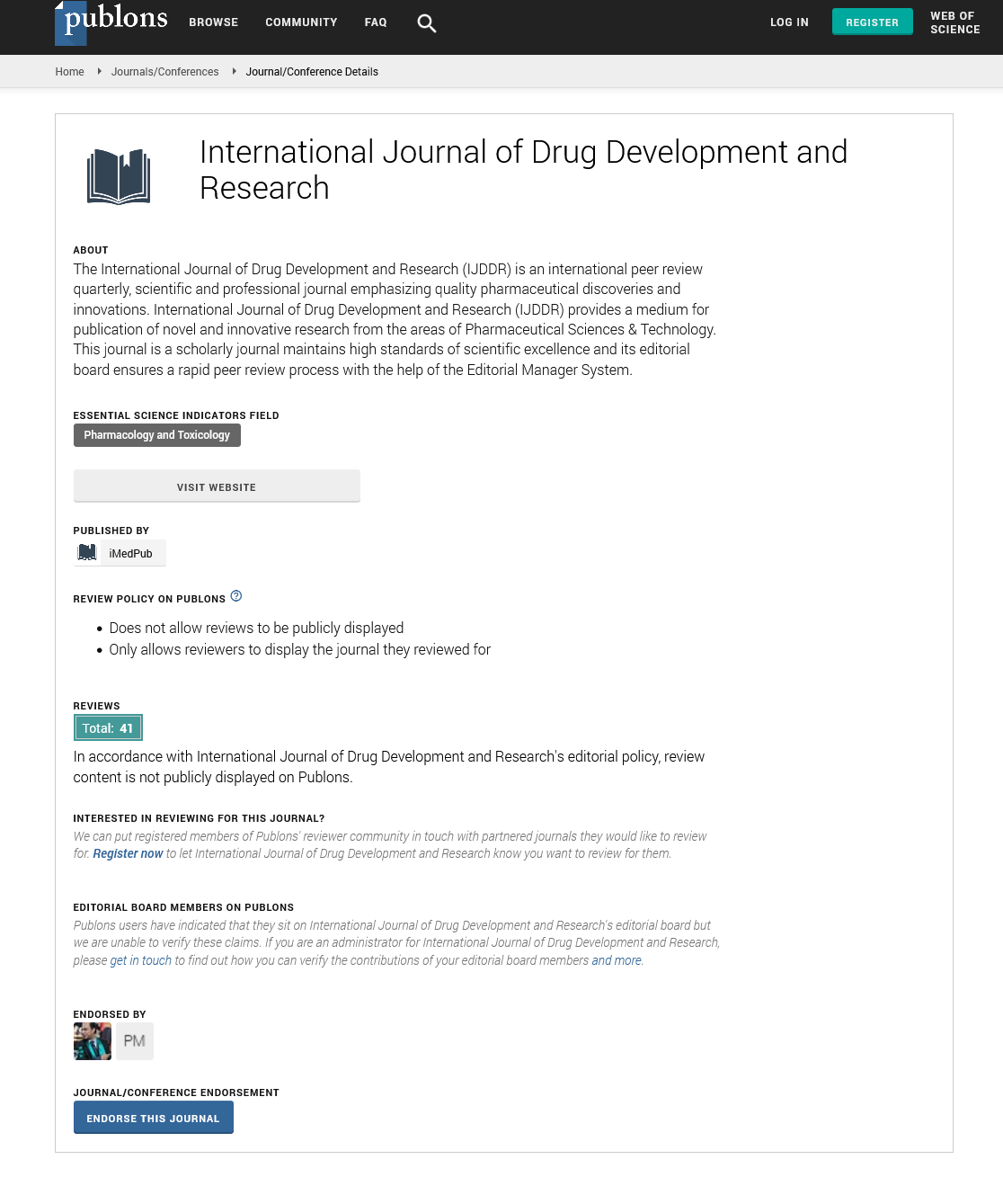Perspective - (2023) Volume 15, Issue 6
Unveiling the marvels of probiotics: A journey through discovery
Assh Bai*
Department of Chemical Sciences, Institute of Chemical Technology, Maharashtras, India
*Correspondence:
Assh Bai, Department of Chemical Sciences, Institute of Chemical Technology, Maharashtras,
India,
Email:
Received: 06-Nov-2023, Manuscript No. ijddr-23-14314;
Editor assigned: 08-Nov-2023, Pre QC No. P-14314;
Reviewed: 22-Nov-2023, QC No. Q-14314;
Revised: 29-Nov-2023, Manuscript No. R-14314;
Published:
08-Dec-2023
Introduction
In the realm of health and wellness, the discovery of
probiotics stands as a remarkable milestone, revolutionizing
our understanding of the intricate relationship between
the human body and the microscopic world within. The
journey of probiotic discovery is a tale of scientific curiosity,
perseverance, and a profound impact on human health.
Description
The genesis of probiotics
The term "probiotic" has its roots in the Greek words
"pro" and "bios," meaning "for life." While the concept
of beneficial bacteria has been acknowledged for centuries,
the formal discovery of probiotics can be traced back to
the early 20th century. The visionary mind behind this
breakthrough was Russian scientist and Nobel laureate Elie
Metchnikoff.
Metchnikoff's ground breaking work
In the early 1900's, Metchnikoff, working at the Pasteur
institute in Paris, became captivated by the longevity
of Bulgarian peasants who consumed fermented milk.
Intrigued by the connection between fermented foods and
health, he delved into the world of microorganisms.
Metchnikoff's attention was particularly drawn to lactic
acid bacteria, prevalent in fermented products. His
research, published in 1907, suggested that these bacteria
could positively influence the gut microbiota, leading to
improved health and increased longevity. This laid the
foundation for the probiotic concept.
Advancements in microbiology
The mid-20th century witnessed significant strides in
microbiology, facilitating a deeper understanding of
microbial communities and their impact on human health.
Scientists began isolating and identifying specific strains of
bacteria, further elucidating their potential benefits.
The identification of Lactobacillus and Bifidobacterium
As research progressed, scientists identified specific
bacterial strains with probiotic properties. Lactobacillus and Bifidobacterium emerged as prominent players in the
probiotic arena. These strains were found to be abundant in fermented foods like yogurt and sauerkraut, reinforcing
the link between traditional fermented fare and gut health.
Technological advances
The latter part of the 20th century saw significant
technological advancements in the field of microbiology,
allowing researchers to delve deeper into the complex
world of microorganisms. DNA sequencing and genomic
analysis revolutionized the study of microbial communities,
enabling a more comprehensive understanding of probiotic
strains and their mechanisms of action.
The emergence of probiotic supplements
With a growing awareness of the potential health benefits
of probiotics, the market saw the emergence of probiotic
supplements. These formulations, often containing a
diverse array of beneficial bacteria, aimed to support
digestive health, boost the immune system, and even
address specific health conditions.
Clinical validation and health benefits
As probiotics gained popularity, researchers initiated
numerous clinical trials to validate their efficacy and explore
their potential applications. These studies revealed a myriad
of health benefits associated with probiotic consumption,
ranging from improved digestive function to enhanced
immune response.
Gut-brain axis: A fascinating connection
One of the most intriguing aspects of probiotic research
is the exploration of the gut-brain axis. Scientists began to
unravel the intricate communication between the gut and
the brain, discovering that the microbiota play a pivotal
role in this bidirectional interaction. Probiotics, it seemed,
had the power to influence not only digestive health but
also mental well-being.
Personalized probiotics: Tailoring health
solutions
Advancements in research paved the way for personalized
probiotics, acknowledging the uniqueness of individual
microbiomes. This personalized approach involves
identifying an individual's specific microbial profile and
customizing probiotic interventions to address their unique
health needs.
Challenges and controversies
While the probiotic landscape is filled with promise, it is
not without challenges and controversies. Questions about
the viability of probiotics in surviving the journey through
the digestive tract, variations in individual responses, and
the need for more standardized research methodologies
continue to be subjects of debate.
Regulatory frameworks and quality assurance
As the popularity of probiotics surged, regulatory bodies
recognized the need for guidelines to ensure product quality
and efficacy. The establishment of regulatory frameworks
helped standardize probiotic products, ensuring that
consumers had access to reliable and effective formulations.
The future of probiotics
The journey of probiotics from their discovery to the
present day is a testament to the dynamic nature of scientific
exploration. Looking ahead, the future of probiotics holds
exciting possibilities. Ongoing research aims to uncover
novel strains, understand their specific functions, and
harness their potential for addressing a spectrum of health
issues.
Conclusion
The discovery of probiotics has undoubtedly transformed
our understanding of health and the symbiotic relationship
between the human body and its microbial inhabitants.
From Metchnikoff's pioneering work to the current era
of personalized probiotics, this journey has been marked
by scientific curiosity, technological advancements,
and a commitment to unravelling the mysteries of the
microbiome. As we stand at the cusp of a new era in
probiotic research, the potential for improving human
health through these microscopic marvels is boundless.






